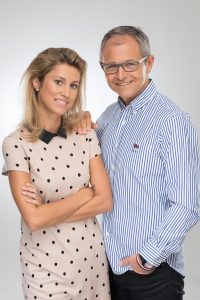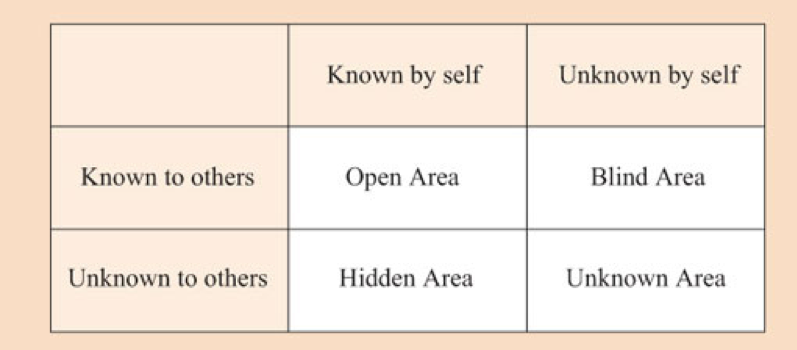
Jan Mühlfeit, Kateřina Novotná
Better Processors, Not Brains
Present day people have to process as much information in one week as they did during the whole life 100 years ago. However, our brain behaves almost the same as it did 100 thousand years ago.
What exactly does this mean for us? First of all, it exposes us to continuous overabundance of stress which we must tackle. And unfortunately, we often do not know how to tackle it effectively due to the lacking self-knowledge.
Better self-awareness and revelation of our talents and weaknesses can help us to find our ways through our complex lives. Still, deepening of our self-knowledge is still kind of neglected field. Even in the academic field of best universities in the U. S. only a minimum people underwent a training focusing on finding one ́s true self.
But finding our true self serves us to better understand our inner life and our own thoughts and fears. Human beings anywhere have around 60 thousand thoughts per day. Most of these repeat themselves. Our task should be becoming knowledgeable about them, to process them as sensibly as possible.
Our Four Key Energies
Do you ever feel exhausted or irritated without being aware why it is so? Our lives are complex, full of information, activities and emotions which may be hard to understand. Nonetheless, there are as few as four main energies that guide us through life and which we can influence intentionally. To do so, we need to start perceiving them.
First energy is our physical potential. It directly relates to our physical activity and nutrition habits. We often deliberately expose our bodies to various harmful substances and damage them by the lack of sleep. We consume too much sugar which steals the energy form usat the end of a day. We do not drink enough water. We frequently forget the key role of physical activity which boosts our psychological resilience by regulating our emotions and settling our thoughts. On a daily basis, we can also indulge ourselves with the stimulating effects of a cold shower. It refreshes our brain and enhances the growth of the synapses.
Apart from sports and nutrition, our physical shape is correlative with the quality of our recovery. The relaxation, sleep or mediation. The western people tend to look on resting as on a weakness due to the supremacy of performance and output. Those we value the most and often too much. However, if we really want to achieve optimal performances or the mental state of flow we simply have to sleep long enough and good enough.
Another layer is our emotional energy. Here, what matters is our ability to process emotions effectively and do not let them to seize control over us. It is good to bear in mind that we are not our thoughts or emotions. Emotion occurs once our thought, positive or negative, meets the body and releases a chemical reaction. If we feel bad we are most probably influenced by a negative emotion which was launched by some thought with a negative tone. In such a case we should stop and try to trace it back. We must ask ourselves where the feeling stems from. Usually, the trigger is a triviality.
Third energy is our mental capacity. It is defined by our ability to stay focused, deal with our emotions and cope with stress thanks to the full focus on a present moment (so called mindfulness). Enough evidence has already been provided that a shattered attention is inflicting negative emotions and stress upon us. We simply need to focus on the current activity, be it a wash-up or a dog walking.
The last energy is our spirituality. Each of us wants to find their purpose in life and feel happy. Often, happiness and fulfilment are experienced when we employ our talents. When we do things we like and are gifted for. Yet, when looking for our own purpose and specialization, motivation can be a ploy. For a motivation, there is a motive needed and a motive is something outside of us, it lies elsewhere. We attach to it even though it is nothing more than a mental construct. Oppositely, the inspiration, comes directly from the inside and is related to state of the flow (e. g. if we carry out tasks using our talents). To achieve the flow as often as possible we must reveal our strengths and build up on them.
Why Self-Awareness?
It is quite simple. If we are doing what we are strong in, we are feeling good and our performance is outstanding. And feeling good, having pleasure of learning or work helps us to prevent stress and cumulating of negative emotions.
But how to start the process of self-knowing, how to find out what our talents are? And how to help our kids to reveal them?
For those purposes we might try special psychometric talent tests where we, using the open questions and examples of various situations, choose these that define us the best. Most of these tests are based on intuitive answers and preferences of each individual. The results help to determine where the respondent ́s strengths lie and which fields are the most promising ones.
People who do not want to undergo such tests can do simple exercises. We can just ask ourselves what energizes us and what deprives us of energy on the contrary. We can make a list of the activities and tasks we hate to do and those we really enjoy. The energizing activities would most probably overlap with our areas of talent and we should develop them further. Importantly, it is natural to have weaknesses as well. Identification of these is something we can also benefit from: we should be aware of our weaknesses and learn them to a certain degree so they would not limit us too much in the future. But they should never become fields of our future focus. Anyway, this is why we have heterogeneous working teams.
Johari Window as a Hint
The Johari window is a method of self-awareness that helps people to better understand their relationship with themselves and others. It describes and classifies our personal qualities into four areas. It is possible to try it out with colleagues, friends or family. The core of this method is a list of 56 adjectives referring to basic human qualities and ways we manifest them. One chooses the adjectives he or she thinks describe them the best. Consequently, the others from the group do the same thing. The chosen characteristics are divided into four different “windows”.

Source: The Open University: http://www.open.edu
First window, so called open, contains the qualities or skills we know about and so do people around us. Second, the hidden one, includes qualities we know about but we keep them hidden from others. Third window, the blind one, relates to aspects other people perceive but we have no idea about them. Last one is veiled for everyone and is called the unknown.
The contents of the hidden window is possible to share with others – we can talk more about our secret qualities or wishes. The discovery of the blind window is also quite easy – we just get feedback from the others. We only need to ask and reflect on it. What should I do? What am I good at? Are there things I should stop doing? The revelation of the unknown is a bit more complicated. And this is where the psychometric tests come in handy. By answering the open- ended questions we can discover our unknown potentials.
Another useful method is an individual coaching. The coach works like a detective asking questions and while giving almost no insights of their own, helps us to achieve better self-knowledge.
Imaginary Fears
Becoming aware of our own emotions or fears and their sources represents a stepping stone for maintaining our mental health. The negative emotions develop quickly and easily. Once we characterize any of our thoughts as unfavourable, we label it with a minus mark, sooner or later, it evolves into a negative emotion.
The old part of our brain, amygdala, plays its role here. It is responsible for storing up memories connected with emotions. Our fears and negative emotions arise from there. Unfortunately, our brain tends to jump from one negative emotion onto another, here and there. Like a little monkey. This is why we, throughout our lives, develop various imaginary fears. Mostly, they are not based on a real physical danger our ancestors had to face.
Our fears rise form the past or relate to the future. If the brain is not trained, it cannot cope with the “little monkey” and all the negative thoughts, the monkey will start controlling us. We will believe we are hopeless and have no potential. Therefore, we become afraid of taking risks and moreover, we might succumb to depression.
An Art to Make Mistakes
The ill-founded fears interfere in the up-bringing as well. The parents might be afraid that without dutiful corrections their offspring will not learn efficiently and are doomed to failure. Undoubtedly, feedback and little steering is useful. But what is even more important is to stop being scared of making mistakes and becoming able to learn one ́s lesson. When children start to perceive failure as a natural outcome of any activity, they can learn from it and move forward. As adults, they will be able to take risks and would not be paralyzed by the fear of failure. Only when we learn to accept our errors we are able to bounce back and proceed.
Keep Your Chin Up!
Regrettably, we still do not know our inner self well enough. Since our childhood, we learn of various aspects of the outside world rather than of ourselves. But in fact, sometimes only a little effort and self-analysis bear fruit.
For instance, we can regulate our emotions through our mere physical posture. We do not say “keep your chin up” without a good cause. If we stand straight and repeat to ourselves “I am a loser” our brain does not buy it. Similarly, if we, being hunched-up, say how great we are, we do not deceive our brain either. Our body harmonizes with our emotions.
It is well known that negative emotions affect our whole body. Negative thoughts produce harmful substances and damage it. This transfer from the soul onto the body is called a somatization. Anyway, the healthy spirit is a precondition for a healthy body. And proper self-awareness helps us to achieve inner harmony and peace. So let‘s get started!
By Jan Mühlfeit,
Global Strategist, Coach and Mentor,
former Microsoft Chairman for Europe
Are you wondering what is the best way to work with your children’s talents and to prepare your children for the future as best as you can? During the “Parent as a positive couch” workshop, parents and teachers find out how to effectively couch and mentor their children according to the latest findings in the field of positive psychology, in order to make their children not only successful, but also happy in their lives. The topics are also based on Jan Mühlfeit’s book − The Positive Leader, one of the best-selling business books in the Czech Republic and abroad. On account of an increasing interest in this workshop, we prepared a new online course odemykanidetskehopotencialu.cz which extracts some of the topics from the original workshop. Try it out!
You can also come to our website janmuhlfeit.com to find out more about our seminars and projects.


[…] learn to practice self-awareness on a daily basis. Examine your thoughts and break negative recurring loops. Tell this to yourself: […]